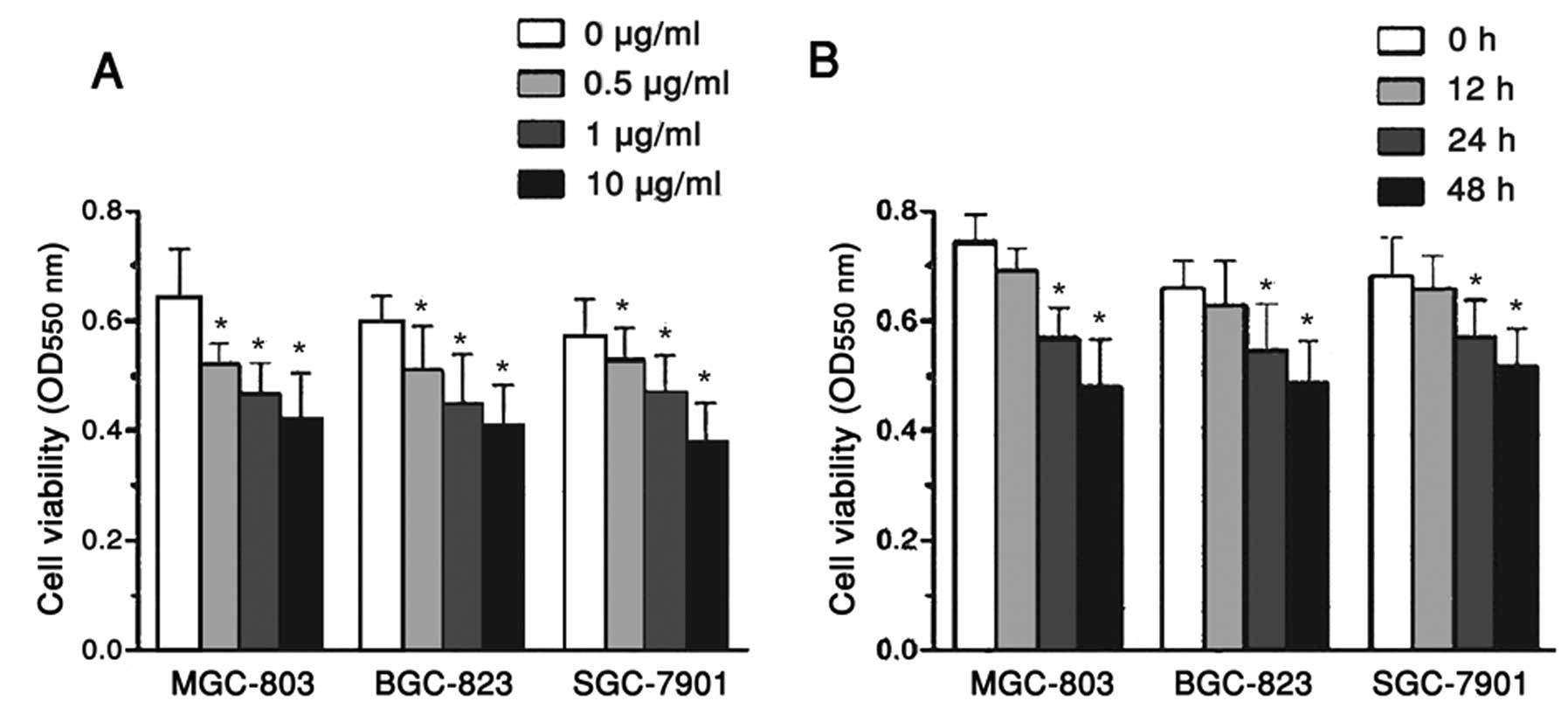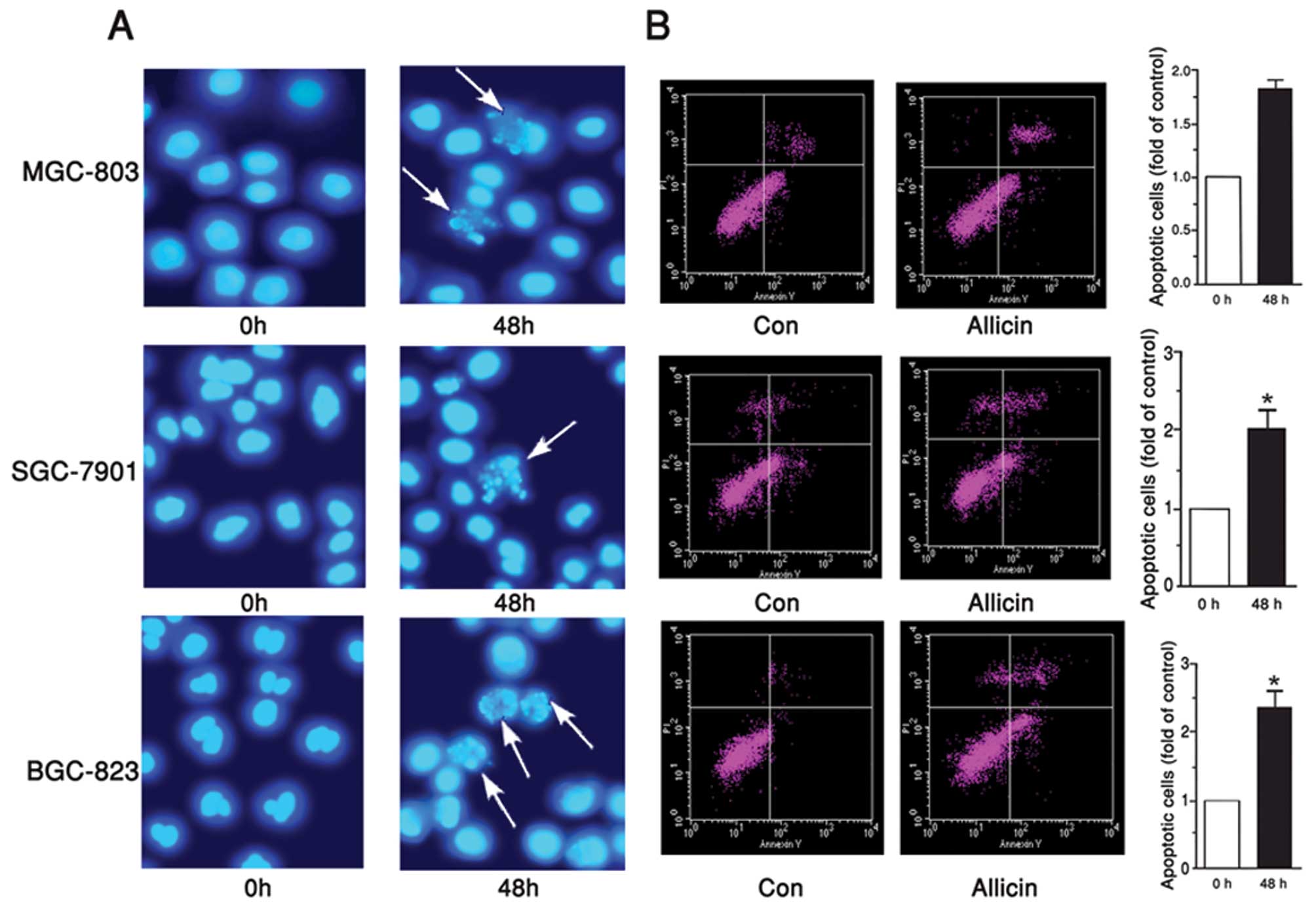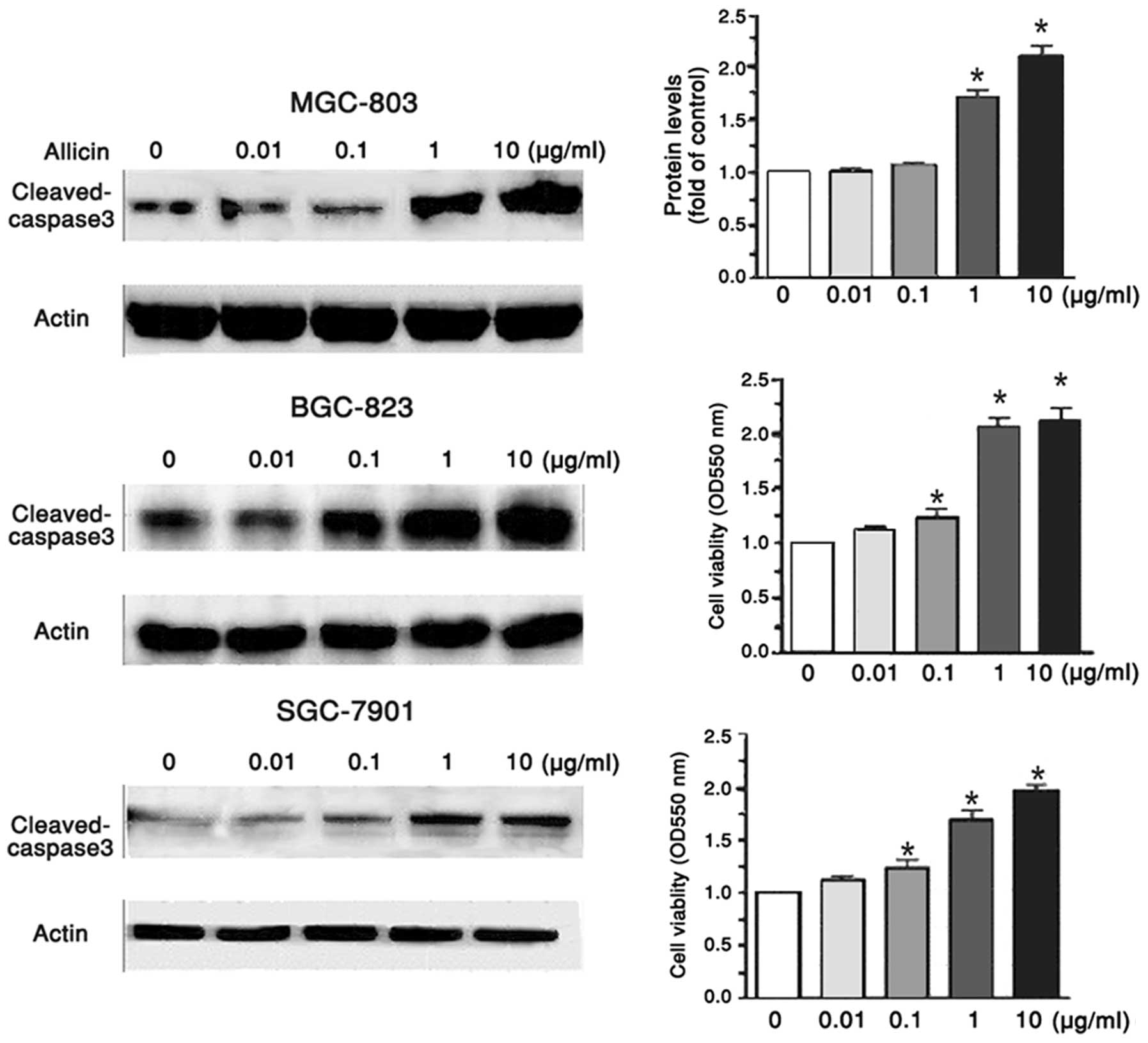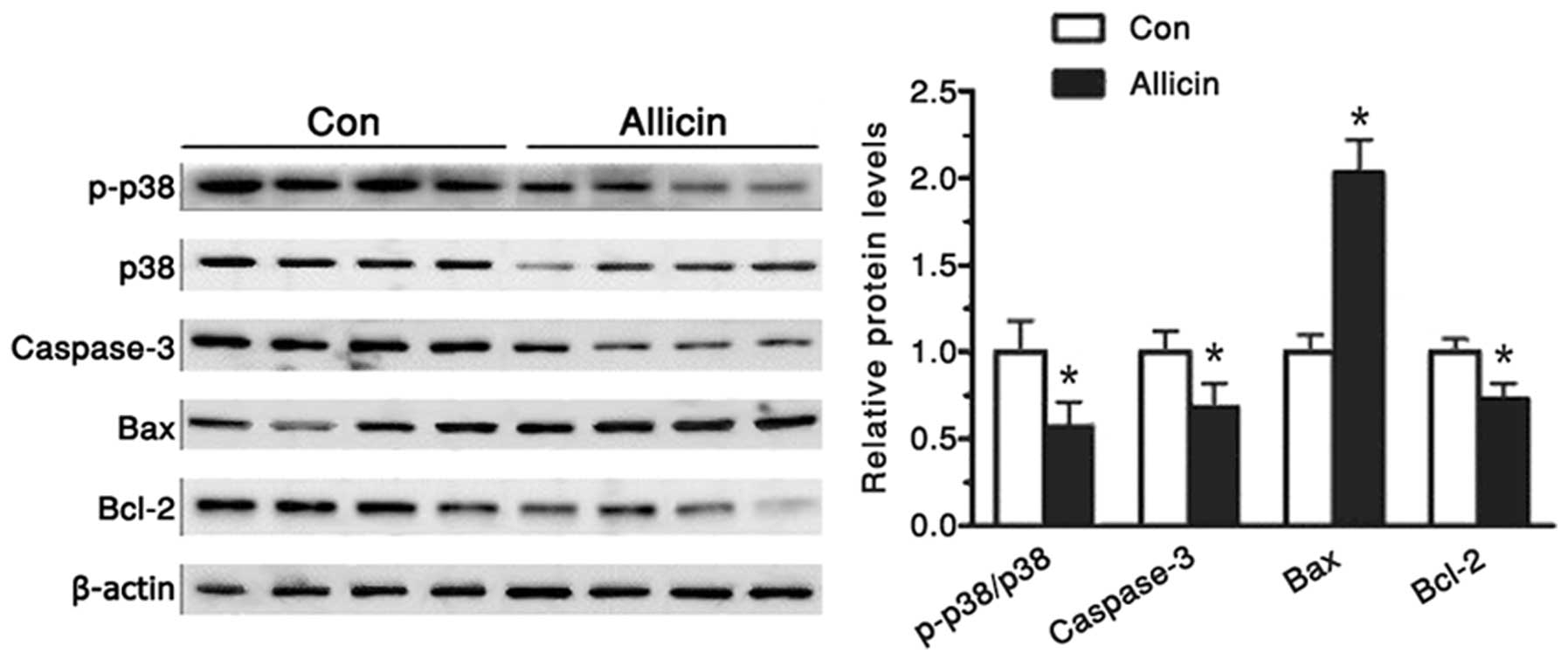|
1
|
Zhang W, Ha M, Gong Y, Xu Y, Dong N and
Yuan Y: Allicin induces apoptosis in gastric cancer cells through
activation of both extrinsic and intrinsic pathways. Oncol Rep.
24:1585–1592. 2010.PubMed/NCBI
|
|
2
|
Ha MW and Yuan Y: Allicin induced cell
cycle arrest in human gastric cancer cell lines. Zhonghua Zhong Liu
Za Zhi. 26:585–589. 2004.(In Chinese).
|
|
3
|
Park SY, Cho SJ, Kwon HC, Lee KR, Rhee DK
and Pyo S: Caspase-independent cell death by allicin in human
epithelial carcinoma cells: involvement of PKA. Cancer Lett.
224:123–132. 2005. View Article : Google Scholar : PubMed/NCBI
|
|
4
|
Zhang YW, Eom SY, Yim DH, et al:
Evaluation of the relationship between dietary factors,
CagA-positive Helicobacter pylori infection, and RUNX3 promoter
hypermethylation in gastric cancer tissue. World J Gastroenterol.
19:1778–1787. 2013. View Article : Google Scholar : PubMed/NCBI
|
|
5
|
Sato T, Kikuchi Y, Saito T, Hirano S and
Kouzuma T: Results of chemotherapy using new anti-cancer drugs
since S-1 for advanced or recurrent gastric cancer in our
institute. Gan To Kagaku Ryoho. 34:1819–1825. 2007.(In Japanese).
PubMed/NCBI
|
|
6
|
Tyagi G, Pradhan S, Srivastava T and
Mehrotra R: Nucleic acid binding properties of allicin:
spectroscopic analysis and estimation of anti-tumor potential.
Biochim Biophys Acta. 1840:350–356. 2014. View Article : Google Scholar
|
|
7
|
Hirsch K, Danilenko M, Giat J, et al:
Effect of purified allicin, the major ingredient of freshly crushed
garlic, on cancer cell proliferation. Nutr Cancer. 38:245–254.
2000. View Article : Google Scholar
|
|
8
|
Chu YL, Ho CT, Chung JG, Rajasekaran R and
Sheen LY: Allicin induces p53-mediated autophagy in Hep G2 human
liver cancer cells. J Agric Food Chem. 60:8363–8371. 2012.
View Article : Google Scholar : PubMed/NCBI
|
|
9
|
Osman M, Adnan A, Salmah Bakar N and
Alashkham F: Allicin has significant effect on autoimmune
anti-islet cell antibodies in type 1 diabetic rats. Pol J Pathol.
63:248–254. 2012. View Article : Google Scholar
|
|
10
|
Liang X, Yang Y, Deng C, et al: The
variation of Caspase3 activity in tanshinone induced NB4 cells
apoptosis. Sichuan Da Xue Xue Bao Yi Xue Ban. 34:549–551. 2003.(In
Chinese). PubMed/NCBI
|
|
11
|
Guo L, Dong F, Hou Y, Cai W, Zhou X, Huang
AL, Yang M, Allen TD and Liu J: Dihydroartemisinin inhibits
vascular endothelial growth factor-induced endothelial cell
migration by a p38 mitogen-activated protein kinase-independent
pathway. Exp Ther Med. 8:1707–1712. 2014.PubMed/NCBI
|
|
12
|
Feidantsis K, Pörtner HO, Markou T, Lazou
A and Michaelidis B: Involvement of p38 MAPK in the induction of
Hsp70 during acute thermal stress in red blood cells of the
gilthead sea bream, Sparus aurata. J Exp Zool A Ecol Genet Physiol.
317:303–310. 2012. View
Article : Google Scholar : PubMed/NCBI
|
|
13
|
Franks HA, Wang Q, Lax SJ, et al: Novel
function for the p38-MK2 signalling pathway in circulating CD1c+
(BDCA-1+) myeloid dendritic cells from healthy donors and advanced
cancer patients; inhibition of p38 enhances IL-12 whilst
suppressing IL-10. Int J Cancer. 34:575–586. 2013.
|
|
14
|
Jameel NM, Thirunavukkarasu C, Wu T,
Watkins SC, Friedman SL and Gandhi CR: p38-MAPK- and
caspase-3-mediated superoxide-induced apoptosis of rat hepatic
stellate cells: reversal by retinoic acid. J Cell Physiol.
218:157–166. 2009. View Article : Google Scholar
|
|
15
|
Andualem B: Combined antibacterial
activity of stingless bee (Apis mellipodae) honey and garlic
(Allium sativum) extracts against standard and clinical pathogenic
bacteria. Asian Pac J Trop Biomed. 3:725–731. 2013. View Article : Google Scholar : PubMed/NCBI
|
|
16
|
Mozaffari-Khosravi H, Hesabgar HA, Owlia
MB, Hadinedoushan H, Barzegar K and Fllahzadeh MH: The effect of
garlic tablet on pro-inflammatory cytokines in postmenopausal
osteoporotic women: a randomized controlled clinical trial. J Diet
Suppl. 9:262–271. 2012. View Article : Google Scholar : PubMed/NCBI
|
|
17
|
Li L, Sun T, Tian J, Yang K, Yi K and
Zhang P: Garlic in clinical practice: an evidence-based overview.
Crit Rev Food Sci Nutr. 53:670–681. 2013. View Article : Google Scholar : PubMed/NCBI
|
|
18
|
Pittler MH and Ernst E: Clinical
effectiveness of garlic (Allium sativum). Mol Nutr Food Res.
51:1382–1385. 2007. View Article : Google Scholar : PubMed/NCBI
|
|
19
|
Zhou Y, Wang Q, Evers BM and Chung DH:
Signal transduction pathways involved in oxidative stress-induced
intestinal epithelial cell apoptosis. Pediatr Res. 58:1192–1197.
2005. View Article : Google Scholar : PubMed/NCBI
|
|
20
|
Simpson KL, Cawthorne C, Zhou C, et al: A
caspase-3 ‘death-switch’ in colorectal cancer cells for induced and
synchronous tumor apoptosis in vitro and in vivo facilitates the
development of minimally invasive cell death biomarkers. Cell Death
Dis. 4:e6132013. View Article : Google Scholar
|
|
21
|
Boosani CS, Nalabothula N, Munugalavadla
V, et al: FAK and p38-MAP kinase-dependent activation of apoptosis
and caspase-3 in retinal endothelial cells by alpha1 (IV) NC1.
Invest Ophthalmol Vis Sci. 50:4567–4575. 2009. View Article : Google Scholar : PubMed/NCBI
|


















